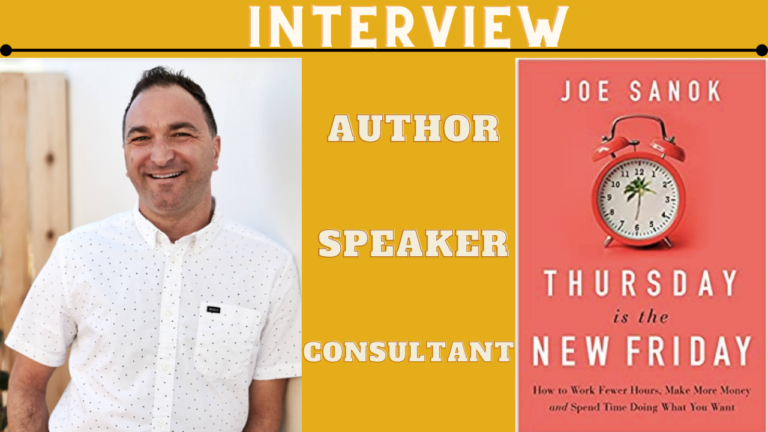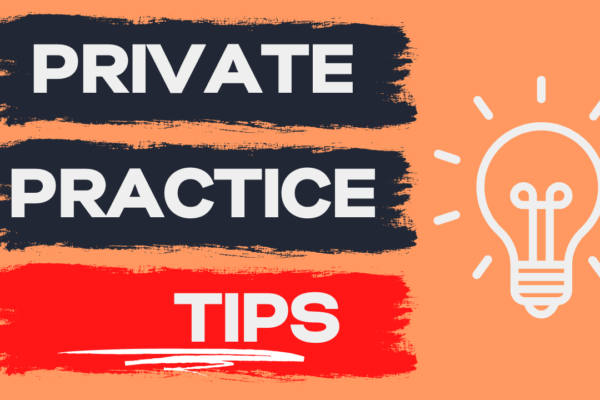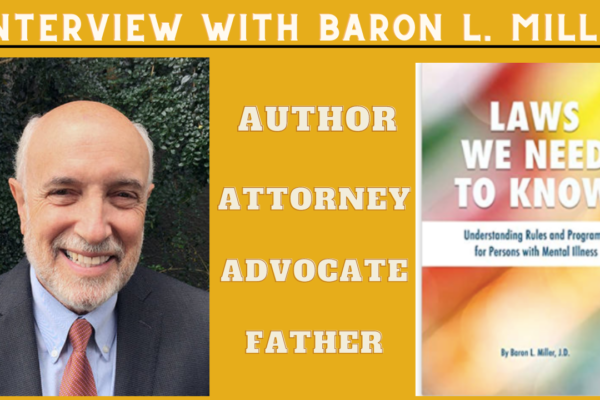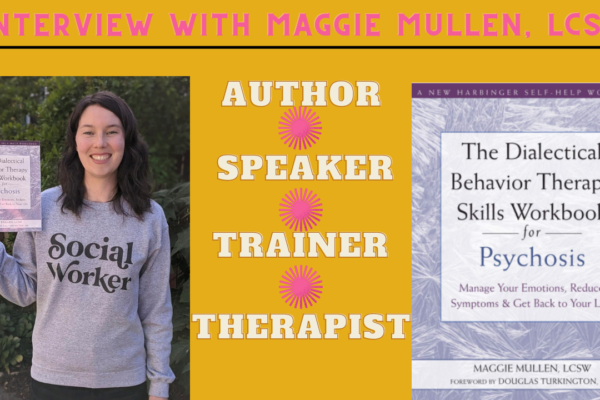In this episode of The Mental Health Toolbox, I interview author, speaker and consultant, Joe Sanok on his new book -Thursday is the New Friday-, hitting shelves October 5th, 2021.
Table of Contents
BIO: Joe Sanok – Speaker, Author Of Thursday Is The New Friday
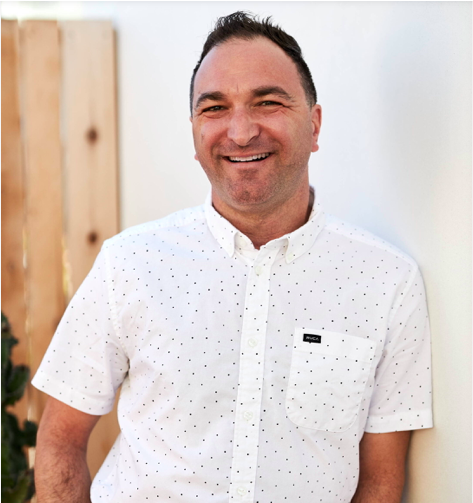
Joe Sanok is the author of Thursday is the New Friday, a TEDx speaker, consultant, and top podcaster. With over 600 interviews he has expertise in brain optimization, slowing down to spark innovation, and the four-day workweek.
Learn More:
https://www.practiceofthepractice.com/
Practice of the Practice Podcast
Get Social: Facebook, Lin, Twitter.
📕 Buy The Book: Thursday is the New Friday https://amzn.to/39JvZyQ
Note: The above is an amazon affiliate link. I receive a small commission for purchases made using this link at no extra cost to you.

Watch the Video Interview Below 👇
Transcript: Interview with Joe Sanok
Speaker 1
Welcome back to the Mental health toolbox.
Speaker 1
And this episode we’re talking all about how to earn more while working less and have more autonomy, with author and Speaker Joe Sanok.
Speaker 1
This is going to be a good one.
Speaker 1
So stick around.
Speaker 1
Joe Sanok is the author of Thursday is the New Friday hitting the shelves October 5th, 2021. He’s also a TEDx speaker, consultant, and top podcaster with over 600 interviews. He has expertise in brain optimization, slowing down to spark innovation and the four-day work.
Speaker 1
Week he’s also known as the owner of.
Speaker 1
Practiceofthepractice.com
Hey Joe, thank you so much for making it onto the mental Health Toolbox podcast. I appreciate you taking out time today to be on the show.
Speaker 2
Patrick, thanks so much for.
Speaker 1
Having me my pleasure, my pleasure.
Speaker 1
I have been a follower of yours for some years now.
Speaker 1
I remember stumbling onto your stuff when I was looking into starting a private practice and you were just oh, not just a wealth of information, but almost.
Speaker 1
Like the only one.
Speaker 1
You know out there that was offering that kind of material for for therapists who are daring to jump, you know, from the dock, to the boat of private practice and.
I just want.
Speaker 1
To start by saying thank you so much for, you know, putting all of this fantastic information out there.
Speaker 1
This resource for clinicians looking to branch out so thank you first and.
Speaker 2
Oh yeah, you’re welcome.
Speaker 2
It’s been such fun work to do and to.
Speaker 2
To really just follow my own curiosity and kind of bring people along for the ride.
Speaker 2
It’s been a fun way to do a podcast and to create content.
Speaker 1
Yeah yeah, I remember first someone on your website and then of course your YouTube videos.
Speaker 1
Great video by the way on how to start a private practice.
Speaker 1
That’s fantastic.
Speaker 1
And then your podcast became an avid listener.
Speaker 1
So, but that’s not all you do.
Speaker 1
You’re kind of a Jack of many trades, and I, you know, I think of you as an ambassador for therapists, right?
Speaker 1
An ambassador.
Speaker 1
Who helps therapists?
Speaker 1
You know, reach their goals of expansion, whether that’s group practice, private practice, you have all of these resources you know between your seminars, retreats, killing at camp.
Speaker 1
Uhm, their podcast.
Speaker 1
I’m wondering what what, what are you best known for?
Speaker 1
Or what would you like to be known?
Speaker 2
Or I mean, I think those are two different things.
Speaker 2
I think I’m best known for the podcast because when I launched that.
Speaker 2
In late 2.
Speaker 2
1012 it was intentional to find a market where there wasn’t anybody at the time.
Speaker 2
And so when you say there was no one else really, there weren’t any podcasts in 2012 around the business of private practice. And so, I think because of that, you know, whenever there was a.
Speaker 2
A new podcast that came out, or a new consultant.
Speaker 2
They frequently would have me on it and say, oh, I’ve listened to for years and it’s so awesome to now know all these amazing podcasters that I’ve known since they first started another big-time consultants also.
Speaker 2
So I think I tend to be known for the podcast and then a lot of the services we offer from that.
Speaker 2
What I would want to be known for really, at least in regard to what kind of the book and what I’ve learned from the book, is reshaping society towards the four-day workweek as I dig into the research and the history around how we look at time and honestly.
Speaker 2
Just you know.
Speaker 2
What it’s like to be the post pandemic generation.
Speaker 2
We have an opportunity right now to reshape.
Speaker 2
All of society.
Speaker 2
In a way that’s healthier, that’s more creative.
Speaker 2
It boosts productivity, and I think that the starting point for that is moving away from the industrialist model of the 40-hour workweek and seeing people as machines and to just move into more of an evolutionary model that has the four-day workweek as that starting point.
Speaker 1
Yeah, very timely.
Speaker 1
With the pandemic, you know, yeah.
Speaker 2
I mean it’s so funny. I joked like this book sponsored by COVID-19.
Right?
Speaker 2
Like when that was happening and I’m writing this book. I mean, I was able to put so much of what was happening ’cause I wrote it from April of 2020 to September of 2020, and so it was in the thick of it all.
Speaker 2
I’m just say we’re going through this and here’s how we’re thinking about time and so to have a book that was literally written during the pandemic, and it’s challenging.
Speaker 2
Our view of time.
Speaker 2
At first, I thought it was going to be really tough for my book launch, but across the board people are saying I want to rethink how I do time and work so it really is more timely than I could have expected.
Speaker 1
Did I’m sure you.
Speaker 1
And yeah, I’m sure you jump into all the concepts around time management in the book.
Speaker 1
You know, I’m excited to get my hands on it.
Speaker 1
You know, I hear about ideas of the hustle culture and Gary Vee and or, you know.
Speaker 1
Batching time, but not everybody works the same, right?
Speaker 1
So I’m excited to see your thoughts on it.
Speaker 2
Yeah, and I think that so often these kind of books either fall into there a productivity book that just says here do this work and they give you a very prescriptive.
Speaker 2
Model which some people need, but I would say this book is more of a menu model where it says here’s how you can grow and be smarter and do experiments and see what works for you and some things will work for some people, some won’t.
Speaker 2
And so having that non prescriptive model that that guides someone to think for themselves or on the other side, we have all these.
Speaker 2
You know, meditation books and other kind of woo woo books make a vision board and don’t even like put any effort into it.
Speaker 2
Just manifest it to the universe.
Speaker 2
But what I really like about what the research that’s emerging is showing is that we need to merge those two types of books that it’s genuinely the slowing down.
Speaker 2
It’s the stepping back.
Speaker 2
It’s how we do our weekends is how we do our evenings how we do our vacations that helps us be more productive that helps us do the best, most creative work.
Speaker 2
And that too often we fall into these two very different camps, and neither one is right on its own.
Speaker 2
But when it comes together as a collective, we have this amazing system where slowing down actually leads to killing it.
Speaker 1
You know that makes sense too when you think about the alpha mindset, you know when you’re in the shower or like taking a walk somewhere.
Speaker 1
It’s when I have my best ideas.
Speaker 1
When I’m relaxed right?
Speaker 1
Not so stressed all the time, yeah?
Speaker 2
Yeah for sure.
Speaker 2
Yeah, I mean I, I think that’s where you know when you’re most stressed out that that’s not when you have your best ideas.
Speaker 2
You just default to what you know.
Speaker 2
I often tell a story about how when I was in Nepal I I got chased by a wild rhinoceros and.
Speaker 1
No way.
Speaker 2
Our guide had told us to climb a tree and I just didn’t.
Speaker 2
I just took off running and because I knew that I could outrun the people I was with for at.
Speaker 2
Least, you know.
Speaker 2
Several 100 yards.
Speaker 1
Slowest person is the Thunder machine.
Speaker 2
And it’s like, yeah, I got 3 Shields behind me and it’s like why didn’t I climb a tree when the guy did, said if a rhinoceros chases this climb a tree?
Speaker 2
Well, when we’re stressed out, we go with.
Speaker 2
But we know you’re not going to try something new like climbing a random new tree in Nepal.
Speaker 2
Like what if I slipped and then got killed by a rhino ’cause I tried some.
Speaker 2
We knew, so we don’t try new things when we’re stressed out and so much of whether we’re in a typical kind of job where you’re at a 40/50 hour workweek or even as an entrepreneur where you’re doing great work as a clinician, but you always have ideas and you’re always going after the next thing.
Speaker 2
And like when can you turn your brain off and say you know what enough is enough for the week.
Speaker 2
I need to chill out and go.
Speaker 2
Have fun for the weekend so that my brain recovers and then next week I might have an even more creative week because they actually took that time to go for a walk or or slow down.
Speaker 1
Yeah, so productivity, really a lot of it boils down to being open to ideas.
Speaker 1
Giving yourself room to play like a sandbox, right?
Speaker 1
Yeah, absolutely.
Speaker 1
Kind of like that.
Speaker 1
Yeah, that whole idea of creating space.
Speaker 2
And I think.
Speaker 2
Yeah, I think.
Speaker 2
Even going further, before you slow down, I talk about internal inclinations and that there’s these three inclinations that top performers have.
Speaker 2
Have that the research really kind of shows over and over, and so if we start inside and do that work first before we ever get to slowing down our productivity, we’re then more effective in those areas that we aren’t slowing down and then saying, oh, I should achieve more.
Speaker 2
Well like why am I not mowing the lawn and doing all these?
Speaker 2
Things around the house to.
Speaker 2
Complete all these tasks.
Speaker 2
We’ve done the inner work that then allows us to slow down and then that slowing down then allows us to kill it more.
Speaker 1
Fantastic, Fantastic night.
Speaker 1
Another thing is particularly interesting is that you’re not just a therapist, you’re a very seasoned therapist, right with a lot of real-life application.
Speaker 1
I know you’ve been through it and we could.
Speaker 1
I’m sure dive into all of your hardships that you’ve been through.
Speaker 1
Which I know you’ve touched on in the past.
Speaker 1
But your perspective.
Speaker 1
You know as a therapist.
Speaker 1
And then how you package that experience into into a book like this on productivity I think is.
Speaker 1
A fantastic intersection because so many therapists.
Speaker 1
I think when they think about the idea of doing private practice and my own experience.
Speaker 1
Making that jump or any big change other than the terrifying unknown factor and all the other risk and catastrophizing right that goes on in your head about the worst possible scenarios is time.
Speaker 1
Right?
Speaker 1
How could I?
Speaker 1
I’m already working X number hours a week plus struggling kids and a family and other responsibilities and laundry and mowing the lawn.
Speaker 1
Like you said, all of those the minute tasks that we’ve that make us feel productive.
Speaker 1
How am I possibly going to find time to write that book?
Speaker 1
Or how am I possibly going to carve out time to?
Speaker 1
Start that business without parent guilt, right?
Speaker 1
Or feeling like an impostor.
Speaker 1
You know.
Speaker 1
And so I I’m wondering, like how did you?
Speaker 1
What drove you to touch on this subject in particular this intersec.
Speaker 2
Yeah, you know part of the evaluation process and doing a traditionally published book.
Speaker 2
I worked with a writing coach for a solid year and she and I every Thursday would meet and she just got me talking and really part of her work with me was to say what are the things that Joe teaches over and over and over.
Speaker 2
That isn’t just regurgitating.
Speaker 2
What other people have taught what’s kind of the unique point of view that I have and for.
Speaker 2
Months I was just like what are we doing here.
Speaker 2
Every week we talk like what are we doing and she’d drill in here and there and then finally it was.
Speaker 2
Here’s what I’m hearing.
Speaker 2
Tell me if.
Speaker 2
This is accurate.
Speaker 2
You know you really help people work a four day work week or fewer.
Speaker 2
You help people do these things.
Speaker 2
You see, people live these men like just huge lives.
Speaker 2
But they’re not working like crazy, and so to hear someone like yourself say, Oh my gosh, I’ve got all this.
Speaker 2
This stress and then how could I even add one more thing on?
Speaker 2
And like when I’m working in these consulting relationships to see people go from feeling that way to being able to really define what the best use of their time is.
Speaker 2
Have amazing systems that do things that they used to be doing, but now they have systems or people in place that are doing that and then just say wow.
Speaker 2
I just freed up a full extra day but I want to spend that with my kids.
Speaker 2
Do I want to spend that doing stuff around the house ’cause that helps me feel better entry into the weekend?
Speaker 2
Do I want to spend half that day working on a book idea or an E course or a podcast?
Speaker 2
And the kind of the way that I conceptualize things is I have the work that I’m doing, that is, the plates that are spinning.
Speaker 2
How do I get those spinning enough that I have to put very little effort into those so that the team keeps it going?
Speaker 2
And then how do I then move into whatever that next big thing is right now?
Speaker 2
That’s a season of this book of, you know, it was first fighting an agent, then it was.
Speaker 2
Writing the book and you know getting a book deal and then promoting the book and then you know as this continues, I don’t know what doors will open.
Speaker 2
The next reasonable step will will reveal.
Speaker 2
Itself, so then the book may move into that plate spinning category where there’s automations.
Speaker 2
I need to have set up within the business of reaching out for podcast interviews or things like that.
Speaker 2
And then I have the next kind of new thing and so kind of having that cycle where every new thing doesn’t become more on my plate.
Speaker 2
It becomes more on the team’s plate and we may have to hire people to keep that going.
Speaker 2
But it’s not ever that my plate is overflowing, and I’m stressed out as a result of the work that I’m doing.
Speaker 1
That’s fantastic, that’s the goal, right is to be able to create.
Speaker 1
Get time back right with systems and and then that kind of resolves the parent guilt or family guilt or whatever.
Speaker 1
Whatever other obligations we’ve mentally tide ourselves to, right?
Speaker 2
Yeah, I mean, even when I enter a weekend.
Speaker 2
I do the same thing that I do during the work week.
Speaker 2
So during the work week, I’m always thinking what’s the highest and best use of my time, and so me showing up.
Speaker 2
On this podcast, I can’t send my director of details to come hang out with you and talk about the book.
Speaker 2
I mean, I could, but it wouldn’t be the same interview, right?
Speaker 2
Same sort of thing.
Speaker 2
If I enter into a weekend and you know right the moment we’re recording this, it’s summer in Northern Michigan where I’m at to say by the end of summer, what do I want to look back on and say I’m so glad that I did that now that it’s, you know, cold again and it’s fall and winter’s coming.
Speaker 2
What are the things that I’m going to wish that.
Speaker 2
I had done more of and so to say.
Speaker 2
I’m going to make sure that this weekend we go to the beach.
Speaker 2
I’m going to make sure this weekend we go on a bike ride or go get ice cream this weekend I want to play a board game with my daughters and so to really define out the big things first and then to be able to then say OK, Now I need to fit in those other things that are more menial tasks.
Speaker 2
So grocery shopping or mowing the lawn or.
Speaker 2
Those things and then maybe it’s OK.
Speaker 2
Wow, I need to outsource the lawn mowing to the neighbor kid and I just bought back part of my weekend.
Speaker 2
Or maybe I need to use Instacart and it may cost me $20.00, but it just saved me 3 hours of amazing weather in northern Michigan that we wait for all year long, you know. And for 30 bucks, I now have enough time to now go to the beach and so.
Speaker 2
Really, analyzing your use of time and money.
Speaker 2
In your own.
Speaker 2
Within what you have the ability to do, and I I know that not everyone can just throw money at things, but we can be strategic around these are tasks I really don’t want to do and I’m going to then figure out how I can automate it as best as possible in my personal.
Speaker 2
Life and in.
Speaker 1
My business that’s fantastic.
Speaker 1
Very well said.
Speaker 1
You know it reminds me of that concept.
Speaker 1
We hear that.
Speaker 1
You know, stick to your zone of genius. Do it online. You can deal with all these CEO’s and.
Speaker 1
Popular entrepreneurs will tell you, but as a therapist, what’s ringing in my head when you talk about this is the idea that meaningful behavior right when we think about them.
Speaker 1
What’s the most meaningful when you talk about regret you know anticipated regret or would be regret using that as a way to kind of work backwards to reverse engineer what’s important, right?
Speaker 2
Yeah yeah, and I mean, I think that therapists often think that they have to bootstrap a lot of their business a lot longer than they really need to.
Speaker 2
And so you know the typical therapist might be doing all their own SEO work.
Speaker 2
They’re doing all their own website updates, they’re doing all their own blogging.
Speaker 2
They’re doing all the phone.
Speaker 2
Also, just the list of things that aren’t therapy.
Speaker 2
You know when it comes down to it, a therapy session you’re making a lot of money compared to the average person in one therapy session.
Speaker 2
Even if you’re on insurance, and so to say I’m going to pay someone 1520 thirty dollars an hour to do these things so I can do an extra hour of therapy. I mean the ROI on that is just huge, and so you know it’s.
Come on.
Speaker 2
Even when if you’re a part time therapist to have someone part time that’s helping with that back-end stuff.
Speaker 2
It then makes you most effective to say I’m just going to do the therapy and the little bit that it takes to support that, and then I also want to continue to expand beyond the therapy practice with, you know, being a podcast guest or whatever the things are.
Speaker 2
You then can level up so much faster than if you just bootstrap every single step of the process, yes?
Speaker 1
Absolutely, it makes complete sense.
Speaker 1
I’m wondering, given your history, I mean being entrepreneur, TEDx Speaker.
Speaker 1
And this isn’t your first rodeo with being an author.
Speaker 1
It’s just like your 5th book, right?
Speaker 1
What would you say made this book so important and with all the things you could talk about, like why this one?
Speaker 2
Yeah, so I think the other books were hyper focused on the private practice world, which was important and is important, but to me this is the first one that really says what skills have I learned as a therapist?
Speaker 2
That apply to therapists, my own audience, but then also apply the general sasao.
Speaker 2
And to say what do small business owners need to know worldwide that I have the market honor that I’ve learned from working with thousands of private practices so so now to be able to say not only is this going to help the therapists, they’re already listeners, followers.
Speaker 2
Whatever word you use, but it also then helps general society.
Speaker 2
Move in a healthier direction towards the four.
Speaker 2
Work week, that’s where it gets really exciting to me to say I get to be a part of a conversation that’s already happening.
Speaker 2
It doesn’t need to be that Joe Sanok is the only leader of the four-day workweek, but that I get to be a strong proponent of it.
Speaker 2
And to say I’m joining this conversation; I’m getting people ideas.
Speaker 2
We’re posting it to the website.
Speaker 2
We’re doing experiments to just see what works.
Speaker 2
And that we really as this post pandemic generation can reshape society in a way that aligns with what the neuroscience is saying aligns with, what kind of creativity research is saying in productivity research.
Speaker 2
And to say we can better society by working less and being less stressed out.
Speaker 1
Great fantastic I’m.
Speaker 1
I’m wondering where can our audience find out more about you?
Speaker 1
Where can they find your book?
Speaker 1
Where do they go?
Speaker 2
Yeah, so they can find the book wherever they get their books.
Speaker 2
You know their local bookstore, I’m sure we’d appreciate you ordering through them.
Speaker 2
It’s available October 5th so you can get it on Amazon or any online dealer.
Speaker 2
As well.
Speaker 2
We’re going to be posting experiments, book clubs, all sorts of additional resources, some video trainings on Joe Sanok. Com, So Joe sanok.com is going to be the hub of all of my speaking and writing, so that’s the best spot there.
Speaker 2
And then if people want private practice resources, practiceofthepractice.com is the best place to get.
Speaker 1
All of those, all right, going strong.
Speaker 1
It was definitely a beacon for me. You know, years ago, practiceofthepractice.com awesome.
Speaker 1
Uhm, alright, anything else you would like to add anything that any golden Nuggets you would like to impart to our.
Speaker 2
Audience I think my final words would just be that you have the ability to level up and to do things for society that you don’t even consider or recognize right now.
Speaker 2
I mean, it’s not going to be you hustling and being burned out and stressed out.
Speaker 2
That’s going to get there.
Speaker 2
You there it’s going to be slowing down and allowing your brain to rest to really see those creative pain points that you want to help address in society.
Speaker 2
So give yourself permission to slow down and it’s going to help you be more creative in product.
Speaker 1
Give fantastic and this new book Thursday is the new.
Speaker 1
Friday is a great way to give you insight into how to do that.
Speaker 1
Right?
Speaker 1
Pause and permission.
Speaker 1
Not sometimes.
Speaker 1
I feel like we just need to give ourselves permission to slow down without you know, feeling guilty about it.
Speaker 1
And so, I think from what I understand already, just in talking to you and seeing other interviews about the book.
Speaker 1
I am excited and I think this is going to be helpful to so many people and figuring this piece out of personal development really, and what this is all about.
Speaker 1
OK.
Speaker 2
Thank you so much for helping make Thursday the New Friday.
Speaker 1
Oh, my pleasure.
Speaker 1
I’m already living it.
Speaker 1
OK Joe, I I appreciate your time.
Speaker 1
I know you’re a busy guy, so I’ll go ahead and let you go and.
Speaker 1
And I will end the recording.
Want to learn more? Check out my top picks for books on self-improvement and recovery HERE!
NEED CRISIS HELP? If you need immediate crisis help with your depression, you can call the National Suicide Prevention Lifeline at 1-800-273-8255 or text “START” to 741-741
OUTSIDE THE UNITED STATES: See International Suicide Hotlines
WHERE TO FIND MENTAL HEALTH HELP:
-NAMI Referral Helpline: 1-800-950-6264
-California’s Statewide Mental Health Helpline: 1-855-845-7415
ASK: If you have a question you’d like me to answer here on the blog (even if you think it’s a silly one!), please use the form on the CONTACT ME page, or the comment section below. I would be happy to take a poke at it and provide a long form answer when appropriate.
SHARE: Also, be sure to share it with a friend, as there is still a lot of work to be done in raising mental health awareness.
SUBSCRIBE to get your FREE MOOD TRACKING TOOL and quick Mental Health Hacks in addition to this newsletter. Sign-up with the form below.
admin
Latest posts by admin (see all)
- Thriving with Autism and ADHD: Expert Strategies for Managing Burnout - April 22, 2024
- Serial Killer Spotlight: Dr. Caparelli’s True Crime Analysis - April 14, 2024
- Donna’s Law: Stop Gun Suicides - March 22, 2024

